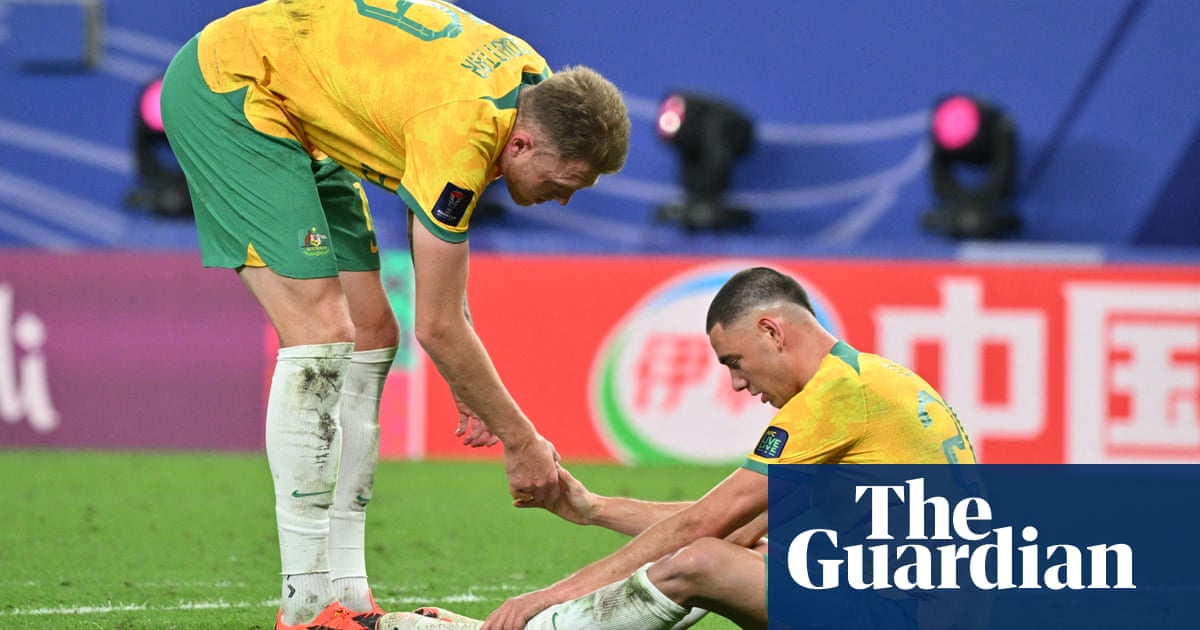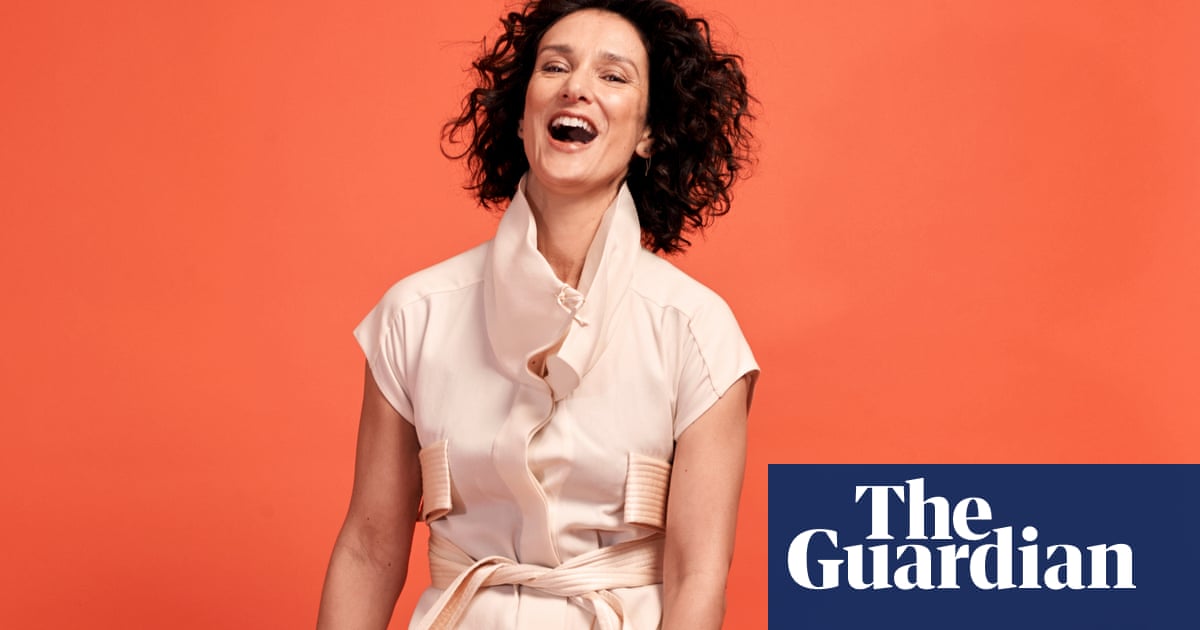
The way Son Heung-min tells it, he was 10 years old and squabbling with his older brother, Heung-yun. Then something happened that has stayed with him.
The Tottenham forward’s father, Son Woong-jung, was a former professional footballer who made it to a good level in South Korea, and he had begun to coach his boys, making it his mission to guide them to the top, avoiding the pitfalls he encountered. On this occasion, he saw red and, to borrow the word Son uses, decided to impose a forfeit.
“He gave us four hours of keepy-uppies,” Son says. “Both of us. After about three hours, I was seeing three balls. The floor was red [through bloodshot eyes]. I was so tired. And he was so angry. I think this was the best story and we still talk about it when we are all together. Four hours keeping the ball up and you don’t drop it. That’s difficult, no?”
Wait, what? Son did not let the ball hit the ground? In four hours? As a 10-year-old? “No,” he says. Impossible! Son’s gaze is steely. “No, not once,” he replies.
The story advertises several things – Son’s natural talent, among them. “As soon as I could walk, I was kicking a ball,” he says. But what shines through and has underpinned his rise, to the point where he can be considered as the pre-eminent player in Asia, is his readiness to respond to the demands of his father. That, and his extraordinary levels of focus and dedication.
Son recounts another tale that features his father and keepy-uppy punishments. “When I was 10 or 12, he came in to coach my school team and we were training, 15 or 20 players. The programme was for us all to keep the balls up for 40 minutes. When someone dropped the ball, my father would not say anything. But as soon as I dropped it, he made us all start over from the beginning. The players understood, because I was his son and, yeah, it was tough. But when you think about it now, this was the right way.”
It is tempting to pigeonhole Son’s father as a remorseless disciplinarian, and wonder whether his drive affected the relationship between the pair. It would be wrong to do so – the reality is Son has nothing but admiration and respect for him. “Was he a strict coach?” Son says. “Yeah. Scary, as well.” Yet the tone is affectionate. In Korean society, a father’s word tends to be law. Son has followed it; he has embraced it.
“My father was thinking of what I needed all the time. He has done everything for me and without him, I probably wouldn’t be where I am today. As a player, you need some help. It’s also important to meet a great manager and then there’s luck, too. Everything has come together for me.”
It has been a remarkable nine months or so for Son, beginning at the World Cup last year, when South Korea were eliminated from the group stage after defeats against Sweden and Mexico but went on to beat Germany in their final match. After the Mexico game, the 26-year-old sobbed uncontrollably when the South Korea president, Moon Jae-in, visited the dressing room.
Son would win the Asian Games as an overage wildcard player with the South Korea Under-23s at the beginning of the season – earning him an exemption from 21 months of military service – but in January, his team lost unexpectedly in the quarter-finals of the Asian Cup to Qatar.
Son’s fortunes at Spurs have soared since Mauricio Pochettino held him back from the mid-November international programme in favour of club training and, crucially, no travelling. Pochettino was worried Son faced mental and physical burnout. Since then he has scored 14 times in 23 appearances for Spurs, giving him 16 for the season. His performances have been key to the push for a top-four finish and the run to the Champions League quarter-finals.
One statistic from Opta shows Son has scored with 19.3% of his Premier League shots this season, making him more clinical than he has ever been in the competition. It has all served to put him in the conversation for the player of the season awards.
“Mid-November was 100% a big period for me,” Son says. “I’d been travelling a lot. I didn’t feel great. I had so many things in my head. It was just a bit rough. The gaffer made the choice and it was perfect for me – some hard training at Spurs and a bit of rest. As I said before, you have to have the luck to meet a great manager. I’ve improved an amazing amount under him.”
What has elevated Son in the eyes of the Spurs support and many neutrals is his respectful nature, energy and positivity, and that smile. For somebody with such confidence in his ability, it is rare to find such humility.
“My father told me when I was young that if I was through on goal but an opponent fell and hurt themselves, I should put the ball out and check on the opponent. Because if you’re a good footballer but don’t know how to respect others, you’re nobody. He is still saying that to me. Sometimes it’s difficult but we are humans before we are footballers. We should respect each other. On the pitch, off the pitch – why should it be different?”
Son is a long way from being the stereotypical footballer. He lives with his parents in a three-bed apartment in Hampstead and, although he and the squad were given the day off on Thursday he was never going to cancel a visit to Vale school in Tottenham, near the club’s new stadium.
He is 10 minutes early, which bears reporting because this almost never happens with world football stars. On the way in, he says to the deputy head that he hopes the children will recognise him. If the remark is not tongue in cheek (and it appears not to be) then it is ludicrously self-effacing.
Son is often referred to as the David Beckham of Asia, because of his marketability and a popularity that transcends his sport. He gets a rock star reception when he lands at any airport in South Korea while he cannot walk the streets in his country for fear of being mobbed. Spurs now have hundreds of match-going Korean fans; there is even a group of them outside the training ground on most days.
Son is a natural with the disabled girls at the school and it is lovely to watch their reaction as he joins in with a coaching session that the Tottenham Hotspur Foundation has laid on. There are hugs, high tens and snazzy handshakes – one of his trademarks.
Son’s ambition burns brightly and he takes single-mindedness to the next dimension. He laughs uproariously when he is reminded of how his father has said he should not marry until after he retires as a player. Son has dated Korean pop stars Bang Min-ah and Yoo So-young, and is unattached.
“My father says this and I agree, as well,” Son says. “When you marry, the number one will be family, wife and kids, and then football. I want to make sure that while I play at the top level, football can be number one. You don’t know how long you can play at the top level. When you retire, or when you are 33 or 34, you can still have a long life with your family.”
It is put to Son that most European managers prefer their players to marry and settle down. “Yeah, because there are many opportunities to do things off the pitch, like drinking or something like this,” he says. “But I am not the type that likes doing this stuff.
“I just want to make sure I make everyone happy by playing at the top level. For example, when I play for Spurs at Wembley, how many Korean flags do you see? I want to keep my level as high as possible for as long as I can, to pay back to them. This is very important for me.
“Do I feel like an ambassador for my country? Of course, I have to be.Another example: when we play at 3pm, it’s midnight in Korea. When we play in the Champions League at 8pm, it’s five in the morning and they still watch on TV. I have to pay back; I take a lot of responsibility.”
Son extends the theme to his parents. “There are different attitudes in Europe and Asia and, of course, people are thinking: ‘Why is he living with his family?’ But who cares about me? Who is helping me to play football? It is them. They gave up their life and they come over here to help me. I have to pay back.
“I am so grateful to them and I really am grateful for every single opportunity to make this. I know being a professional is about more than talent. It’s like my idol, Cristiano Ronaldo, who actually works more than the talent he has. I see many players who don’t have the mentality, who think talent is enough. But it’s not.”
Son has always put in the hard yards. Even when he broke into the Hamburg team at 18, his father – on visits from South Korea – would put him through gruelling additional workouts. There have been numerous moments when it has all felt worthwhile, with the recent Asian Games triumph prominent among them.
To many South Koreans, it was more about Son winning his freedom from military service than winning a tournament – which shows the affection in which he is held. Unsurprisingly, Son is having none of that and, as an aside, he will undertake the basic, four-week soldier’s training course either this summer or the next.
“It was a massive tournament – not because of me – and, when it was such a big thing, I was very happy and proud to win it; proud of my country, proud of my teammates,” Son says.“As I’ve said before, it was not my aim to avoid military service. My aim is simply to be great as a footballer – all the time. This is one part of that.” The Guardian Sport












